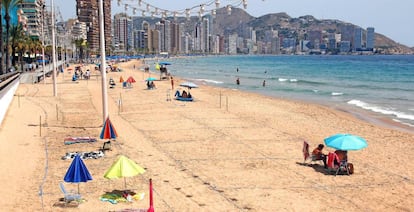Spain approves €7 billion in direct aid for struggling businesses
The non-refundable payouts are part of a larger €11 billion fund announced two weeks ago to stimulate the economy and prevent a wave of corporate insolvencies as the Covid-19 crisis rages on

The Spanish government on Friday approved an €11-billion economic relief package that includes €7 billion in direct aid to distressed businesses.
Announced over two weeks ago by Prime Minister Pedro Sánchez and greenlighted at an extraordinary Cabinet meeting today, the package includes three separate funds: a €3 billion pool to restructure state-guaranteed loans, to be managed by the banking sector; a €1 billion reserve to recapitalize medium-sized companies, run by the state-owned financing company Cofides; and €7 billion in non-refundable direct aid to self-employed workers and small and medium-sized enterprises (SMEs) affected by the coronavirus crisis.
Of this latter amount, €2 billion will go to the Balearic Islands and Canary Islands, two regions hard hit by the crisis.
Eligible companies must prove that their revenues fell by at least 30% in 2020 from 2019, and the cash grants must be used for fixed expenses or debt reduction. The aid targets sectors particularly affected by the pandemic, such as hospitality, wholesale and retail distribution, or culture.
The self-employed may collect up to €3,000 or €4,000 depending on whether they file taxes under the módulos system or not. Businesses may be eligible for up to €200,000, said Economy Minister Nadia Calviño at a news conference following the Cabinet meeting.
Direct aid to struggling businesses has been a longstanding demand in Spain, where restrictions to contain successive waves of the coronavirus have pummelled the retail, hospitality and tourism sectors.
The government had expressed concern about the possibility of so-called “zombie companies” taking payouts and then shutting down, as has been the case in other countries. But international organizations said that the risk of not providing direct financial assistance outstrips the risk of helping out non-viable firms.
To reduce this risk, aid will be contingent on keeping the business open until at least June 2022, and not raising company executives’ pay, among other conditions. Recipients will have to be up to date with their tax filings and not operate in tax havens.

Ever since Sánchez, of the Socialist Party (PSOE), announced the €11-billion aid package two weeks ago, the executive has been struggling to find a way to ensure there are clear targets and strong oversight for the direct aid. This will be the first instance of mass aid for businesses since Spain joined the European Union in the mid-1980s.
Who should hand out the checks, and who should provide the oversight, has been a subject of heated debate over the last two weeks. In one of the most controversial decisions affecting the plan, regional governments will be in charge of handling the payouts, according to sources familiar with the matter. The Finance Ministry will monitor the aid to make sure recipients use it to cover fixed expenses (such as rent) and to reduce debt levels (such as paying suppliers and employees).
Supporting tourism
The government hopes the package will help stimulate a sluggish economy dealing with the third wave of the coronavirus pandemic. The International Monetary Fund (IMF), the European Commission, the European Central Bank and the Bank of Spain have all been warning for months about the risk of a wave of corporate insolvencies once existing government programs are phased out, including the job retention scheme known as ERTE.
Some ministers feel that Spain is late stepping up to the plate: with Brussels’ consent, similar schemes have been in place for some time now in Germany, France, Italy, United Kingdom and neighboring Portugal.
The package will allocate €2 billion of the €7 billion direct aid fund y to the Balearic and Canary islands, the two regions of Spain most affected by the coronavirus restrictions. In the Balearics, gross domestic product (GDP) fell by 27% in 2020; in the Canary Islands it dropped by around 20%, according to Bank of Spain data.
English version by Susana Urra.
Tu suscripción se está usando en otro dispositivo
¿Quieres añadir otro usuario a tu suscripción?
Si continúas leyendo en este dispositivo, no se podrá leer en el otro.
FlechaTu suscripción se está usando en otro dispositivo y solo puedes acceder a EL PAÍS desde un dispositivo a la vez.
Si quieres compartir tu cuenta, cambia tu suscripción a la modalidad Premium, así podrás añadir otro usuario. Cada uno accederá con su propia cuenta de email, lo que os permitirá personalizar vuestra experiencia en EL PAÍS.
¿Tienes una suscripción de empresa? Accede aquí para contratar más cuentas.
En el caso de no saber quién está usando tu cuenta, te recomendamos cambiar tu contraseña aquí.
Si decides continuar compartiendo tu cuenta, este mensaje se mostrará en tu dispositivo y en el de la otra persona que está usando tu cuenta de forma indefinida, afectando a tu experiencia de lectura. Puedes consultar aquí los términos y condiciones de la suscripción digital.








































